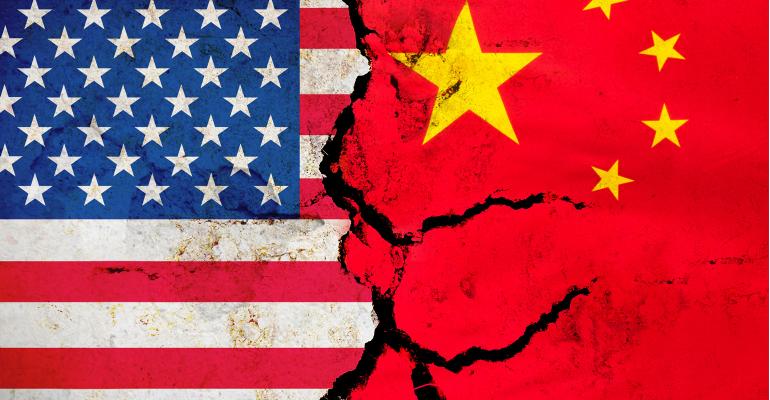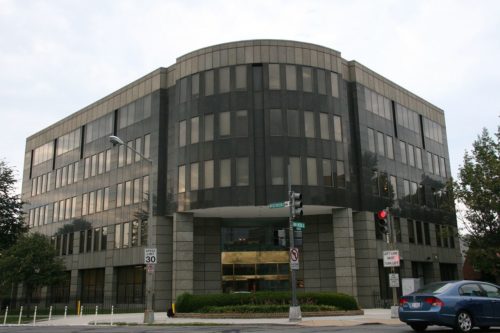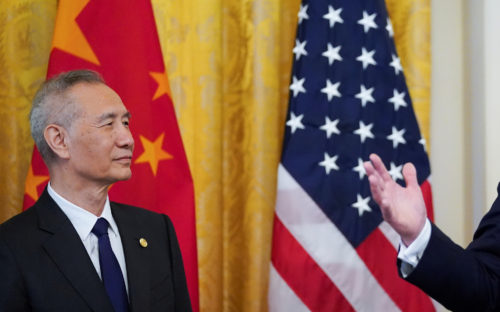Trade war, day 152: Tariff Man tweets, markets plunge

The morning tweets of Donald Trump today gave reasons for both optimism and pessimism about the future of U.S.-China trade negotiations, following the vague tariff cease-fire agreed to at the G20 (Access paywall).
On the one hand, Trump indicated that the negotiating window of “90 days” could be extended if a “real deal” is not achieved by the end of February (tweet 1):
“The negotiations with China have already started. Unless extended, they will end 90 days from the date of our wonderful and very warm dinner with President Xi in Argentina.”
On the other hand, Trump has again declared his love for tariffs, in the process solidifying the impression that he does not understand how they work at all (tweets 2 and 3; the NYT has a helpful explainer on how tariffs actually work):
“President Xi and I want this deal to happen, and it probably will. But if not remember, I am a Tariff Man. When people or countries come in to raid the great wealth of our Nation, I want them to pay for the privilege of doing so… We are right now taking in $billions in Tariffs.”
These tweets were the primary drivers of one of the largest stock market drops of 2018, the Washington Post reports: “The Dow Jones industrial average dropped 799 points, or 3.1 percent, to close at 25,027. The Standard and Poor’s 500-stock index fell 3.2 percent, and the tech-heavy Nasdaq gave up 3.8 percent.”
- Complicating the outlook is the fact that China has not confirmed either of the two parts of the deal that the White House has claimed would be put into effect “immediately”: a substantial purchase of American agricultural products, and a lowering of Chinese tariffs on imports of American cars.
- The silence is because “bureaucrats from various ministries in Beijing are awaiting the return of Xi and his entourage of senior officials to China before they are able to comment or take action,” Bloomberg reports (porous paywall).
- The White House may be getting impatient, it seems, as Trump economic adviser Larry Kudlow has described the purchase of agricultural products and lowering of auto tariffs as a “litmus test” for continued negotiations to proceed.
If negotiations proceed, U.S. Trade Representative Robert Lighthizer will be leading them, the Wall Street Journal today confirms (paywall), after trade adviser Peter Navarro first indicated that yesterday to NPR. The official selection of a point person for trade negotiations, after over a year of factionalism that greatly frustrated Beijing, is a positive development, writes noted China-watcher Bill Bishop (paywall):
“I believe at least some on the Chinese side are happy with Lighthizer’s appointment, even though they know he is an incredibly competent hawk and negotiator. [Treasury Secretary] Mnuchin no longer has much credibility in Beijing given his inability to keep the deal Liu He thought they had struck in May and the Chinese also understand the Lighthizer needs to sign off any deal for it to have a chance, though so long as Trump had not specifically named Lighthizer as the point person protocol dictated spending more time with Mnuchin.”
Also of note today: New punishments for intellectual property violations were announced by China’s National Development and Reform Commission, Bloomberg reports (porous paywall). Violators would be “banned from issuing bonds or other financing tools, and participating in government procurement,” as well as “restricted from accessing government financial support, foreign trade, registering companies, auctioning land or trading properties,” Bloomberg says.
It is unclear if this is the agreement that Larry Kudlow was referring to when he said yesterday that the U.S. and China are “pretty close to some agreements on the forced transfer of technology from American companies.”
More trade-war-related news:
- Confusion and bluster from U.S. officials
Trump’s advisers struggle to explain deal he says he cut with Xi / Bloomberg (porous paywall)
“Questioned about the agreement on Monday, Treasury Secretary Steven Mnuchin and Trump’s top economic adviser, Larry Kudlow, dialed back expectations and added qualifiers.”
White House corrects top aide on China negotiations timeline / CNN
“The White House corrected the transcript of a briefing call with National Economic Council Director Larry Kudlow Monday, stating that the 90-day clock on trade negotiations with China began December 1, not January 1, as Kudlow told reporters earlier in the day.”
Xi Jinping ‘bolstered Chinese commitments’ to US by taking lead role in trade talks, says White House aide Larry Kudlow / SCMP
“Chinese President Xi Jinping ‘made the pitch himself’ in Saturday’s dinner with Donald Trump that ended with a truce in the trade war with the US, according to White House economic adviser Larry Kudlow.”
Pompeo defends US policy, slams China, Russia and Iran / AFP
“Secretary of State Mike Pompeo mounted a staunch defense of US foreign policy on Tuesday (Dec 4), arguing that Washington is building a world order to fight cynical abuses by Russia, China and Iran.”
“He accused China of cynically exploiting WTO rules to unfairly advance its own economic interests and launched a stinging attack on the ICC, which he said was ‘trampling’ on the sovereignty of independent countries… ‘This is what President Trump is doing. He is returning the United States to its traditional central leadership role in the world.’” - Currency
China’s renminbi in biggest two-day rise since 2005 revaluation / FT (paywall)
“At 6.8338 yuan per dollar, the currency has edged back from the precipice of the Rmb7 level that had sparked concern among investors and analysts and weighed on other emerging market currencies.” - Commentary
Editorial: No cause for optimism on US-China trade talks / Nikkei Asian Review
“Unfortunately, there is no cause for optimism about how the U.S.-China trade talks will play out. The standoff between the two countries is deep-rooted: China clearly wants to achieve economic and technological dominance, while the U.S. is determined not to let that happen. Resolving complex issues in which American and Chinese interests are at stake in just 90 days is an extremely difficult challenge — and that is even if Washington chooses not to press Beijing over its ‘Made in China 2025’ program aimed at fostering high-tech industries.” - Biotech
U.S.-China trade tensions threaten biotech cash surge / Bloomberg (porous paywall)
“Increasing wariness in Washington over China’s investments in U.S. biotechnology companies may cool a hot source of capital for medical startups. Chinese investors have been a mainstay of recent fundraising by private biotechnology firms. At least one Chinese investor has participated in 41 U.S. biotech financing deals valued at a total of $2.6 billion this year, according to Pitchbook.” - Agriculture
China likely to resume U.S. soy deals, but action on tariffs uncertain: USDA chief / Reuters
“China will probably resume buying American soybeans around Jan. 1 because of limited supplies in Brazil after slashing imports from the United States due to the U.S.-China trade war, U.S. Agriculture Secretary Sonny Perdue said on Monday.” - Fentanyl
AP FACT CHECK: Trump claims wrong drug concession from China / AP
“U.S. President Donald Trump is claiming victory in getting China to designate fentanyl a controlled substance, but China took that step against the deadly opioid years ago. What’s actually on the table is a far more sweeping shift in the way China regulates synthetic opioids. The question is how China will follow through on its words.”
Lawmakers cautiously optimistic about Trump’s move to curb flow of fentanyl from China / CNBC
U.S.-China fentanyl pact is not expected to produce immediate results / Washington Post - Tech cold war
Chip wars: China, America and silicon supremacy / Economist (porous paywall)
“The trade conflict that matters most between America and China is a 21st-century fight over technology. It covers everything from artificial intelligence (ai) to network equipment. The fundamental battleground is in semiconductors. The chip industry is where America’s industrial leadership and China’s superpower ambitions clash most directly. And whatever Messrs Trump and Xi say at the g20, this conflict will outlast them both.”
Previously in The China Project’s trade war coverage:






